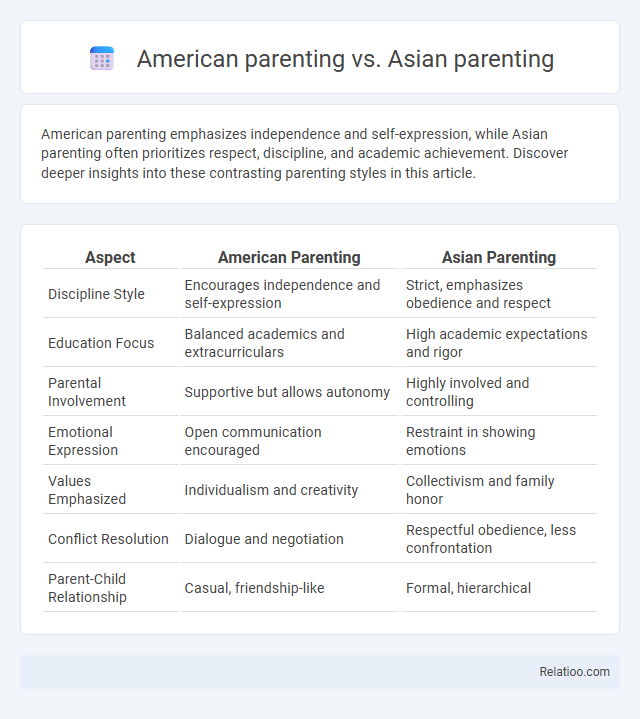American parenting emphasizes independence and self-expression, while Asian parenting often prioritizes respect, discipline, and academic achievement. Discover deeper insights into these contrasting parenting styles in this article.
Table of Comparison
| Aspect | American Parenting | Asian Parenting |
|---|---|---|
| Discipline Style | Encourages independence and self-expression | Strict, emphasizes obedience and respect |
| Education Focus | Balanced academics and extracurriculars | High academic expectations and rigor |
| Parental Involvement | Supportive but allows autonomy | Highly involved and controlling |
| Emotional Expression | Open communication encouraged | Restraint in showing emotions |
| Values Emphasized | Individualism and creativity | Collectivism and family honor |
| Conflict Resolution | Dialogue and negotiation | Respectful obedience, less confrontation |
| Parent-Child Relationship | Casual, friendship-like | Formal, hierarchical |
Defining American and Asian Parenting Styles
American parenting often emphasizes fostering independence, open communication, and self-expression, with a focus on individual achievement and emotional support. Asian parenting tends to prioritize respect for authority, academic excellence, and collective family goals, often highlighting discipline and obedience. Understanding these distinct styles helps you navigate cultural influences that shape parental expectations and child development practices in diverse contexts.
Core Values in American Parenting
American parenting emphasizes independence, self-expression, and individuality, fostering critical thinking and personal freedom in children. Core values include promoting open communication, encouraging self-reliance, and nurturing emotional intelligence. The cultural influence stresses a balance between freedom and responsibility, shaping children to be confident decision-makers within diverse social contexts.
Core Values in Asian Parenting
Asian parenting emphasizes core values such as filial piety, discipline, and academic excellence, reflecting deep-rooted Confucian principles. These values prioritize family honor, respect for elders, and perseverance, shaping children's behavior and motivations within a collectivist culture. In contrast, American parenting often highlights individualism, self-expression, and independence, illustrating differing cultural influences on child-rearing practices.
Approaches to Discipline and Authority
American parenting often emphasizes positive reinforcement and open communication, promoting independence and self-expression, while Asian parenting tends to prioritize strict discipline, respect for authority, and high academic expectations. Cultural influence shapes these approaches through societal values: American culture values individuality and emotional intelligence, whereas many Asian cultures stress filial piety, obedience, and collective family honor. These differing disciplinary methods reflect broader cultural attitudes toward authority, autonomy, and social roles.
Academic Expectations and Education
American parenting often emphasizes fostering creativity and critical thinking in education, encouraging Your child to explore diverse academic interests. Asian parenting typically prioritizes rigorous academic achievement, with high expectations for discipline, standardized test performance, and mastery of core subjects like math and science. Cultural influence significantly shapes these approaches, impacting study habits, parental involvement, and the value placed on educational success across different communities.
Family Structure and Parent-Child Relationships
American parenting emphasizes individuality and open communication within nuclear family structures, fostering independence and emotional expression between parents and children. Asian parenting often reflects collectivist values with extended family involvement, where respect, obedience, and academic achievement are prioritized in parent-child relationships. Cultural influences shape these dynamics by reinforcing societal norms, with American families promoting egalitarian bonds and Asian families upholding hierarchical and interdependent roles.
Emotional Expression and Communication
American parenting often emphasizes open emotional expression and direct communication, encouraging children to vocalize their feelings and thoughts freely. Asian parenting typically values emotional restraint and indirect communication, fostering respect and harmony within the family dynamic over overt emotional display. Your understanding of these cultural influences can enhance cross-cultural empathy and improve communication in diverse social settings.
Independence vs. Interdependence
American parenting often emphasizes fostering independence, encouraging children to make individual choices and develop self-reliance from an early age. In contrast, Asian parenting typically promotes interdependence, highlighting family cohesion, respect for authority, and collective responsibility. Cultural influences shape these approaches, with Western societies valuing personal autonomy and Eastern societies prioritizing social harmony and connectedness.
The Role of Cultural and Social Influences
American parenting often emphasizes individuality and self-expression, fostering independence through open communication and emotional support. Asian parenting typically values discipline, academic excellence, and respect for authority, reflecting Confucian ideals and collective family goals. Cultural and social influences shape these approaches, as Western societies prioritize personal freedom while many Asian cultures emphasize community harmony and filial piety, impacting child-rearing practices and expectations.
Parenting Outcomes: Success, Challenges, and Adaptation
American parenting often emphasizes independence and self-expression, promoting creativity and resilience in children, while Asian parenting typically focuses on discipline, respect, and academic achievement, which can lead to high success rates but also increased pressure and stress. Cultural influence plays a crucial role in shaping these parenting styles, impacting children's social skills, emotional well-being, and adaptability to diverse environments. Your understanding of these differences can help tailor approaches that balance achievement with emotional support for optimal parenting outcomes.

Infographic: American parenting vs Asian parenting
 relatioo.com
relatioo.com